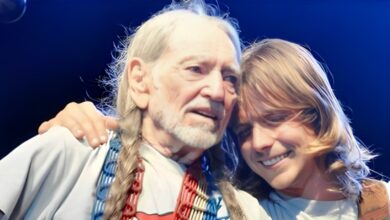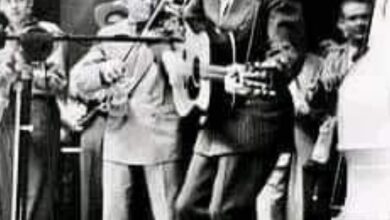In 1958, Conway Twitty delivered a timeless hit with the release of “It’s Only Make Believe.”
Conway Twitty’s “It’s Only Make Believe” stands as one of the timeless classics of the early rock and roll era. Released in 1958, the song skyrocketed Twitty to stardom and remains a staple of oldies radio stations and playlists to this day. With its catchy melody and heartfelt lyrics, “It’s Only Make Believe” captures the essence of youthful romance and longing, resonating with listeners across generations.
The song’s narrative revolves around the pain of unrequited love, as the protagonist grapples with the realization that the object of their affection does not reciprocate their feelings. Twitty’s emotive vocals, infused with a sense of yearning and vulnerability, bring the song’s emotions to life, making it easy for listeners to empathize with the narrator’s plight. The soaring chorus, with its memorable refrain of “It’s only make believe,” underscores the bittersweet nature of the protagonist’s fantasies and serves as a poignant reminder of the power of imagination to heal heartache.
“It’s Only Make Believe” catapulted Twitty to superstardom, earning him his first No. 1 hit on the Billboard Hot 100 chart and establishing him as a force to be reckoned with in the world of music. Its crossover appeal helped broaden Twitty’s fan base beyond the confines of the country music genre, cementing his status as a versatile and dynamic performer.
Conway Twitty, born Harold Lloyd Jenkins on September 1, 1933, in Friars Point, Mississippi, led a remarkable life that saw him transition from rock and roll sensation to one of the most successful country artists of all time. Raised in a musical family, Twitty began his career as a rockabilly singer in the 1950s, scoring hits with songs like “It’s Only Make Believe,” “Danny Boy,” and “Lonely Blue Boy.”
In the 1960s, Twitty shifted his focus to country music, where he found even greater success. With his smooth baritone voice and knack for storytelling, he churned out a string of chart-topping hits, including “Hello Darlin’,” “Tight Fittin’ Jeans,” and “After the Fire Is Gone,” a duet with Loretta Lynn. Twitty’s ability to seamlessly blend elements of rock, pop, and country music helped him appeal to a wide audience and solidify his place in music history.
Beyond his musical accomplishments, Twitty was also a savvy businessman, establishing himself as a shrewd entrepreneur in industries ranging from real estate to publishing. Despite facing personal and professional challenges throughout his life, including struggles with addiction and marital woes, Twitty remained dedicated to his craft and continued to churn out hits well into the 1990s.
Twitty’s enduring legacy is evident in his countless accolades and honors, including inductions into the Country Music Hall of Fame and the Rockabilly Hall of Fame. His influence can be heard in the music of countless artists who followed in his footsteps, making him a true pioneer and trailblazer in the world of music. Though he passed away on June 5, 1993, Twitty’s music continues to captivate audiences and inspire artists to this day, ensuring that his legacy will endure for generations to come.





